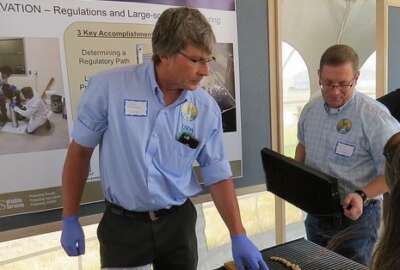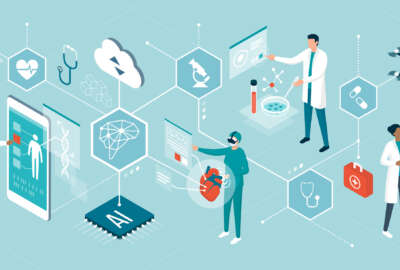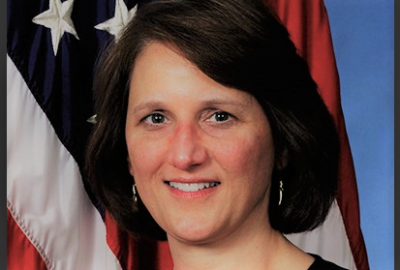A new potential way for federal scientists to get some guidance in their careers
The Federal Lab Consortium (FLC) is looking to see if there is interest in a mentorship program for federal technology transfer professionals. It recently wrapped...
The Federal Lab Consortium (FLC) is looking to see if there is interest in a mentorship program for federal technology transfer professionals. It recently wrapped up a survey of FLC members to gauge the viability of such a program. To hear about how the survey went and what a program like this would look like, the Federal Drive with Tom Temin Executive Producer Eric White spoke to Whitney Hastings, the Chair of the FLC, as well as a Senior Technology Transfer Professional with the National Cancer Institute, along with David Kistin, Vice Chair of the FLC, and also Manager of Technology and Economic Development at the Sandia National Laboratories.
Interview Transcript:
Whitney Hastings So we’re always trying to find different ways to increase engagement amongst all of our labs because we’ve got big labs, small labs and labs with different missions and priorities, but we can all learn from each other. And so one of the things we did at one of our earlier executive board meetings was came up with BHAGS or the big hairy, audacious goals, like, what do we want to do to get our members excited about that policy? One of the things that constantly polls highly amongst our members is networking, you know, sharing best practices and learning from others. So a mentorship program was like a natural progression from our traditional training and education, trying to do that one on one career development type of pathways.
Eric White All right. And when you say career development, what does that you know, is that just kind of advice for the average lab worker or is there a tech worker or is there another thing that comes into mind when you all, you know, first thought of this?
Whitney Hastings Well, for me, it was I was thinking about myself as a mid-level tech transfer professional. Like, I wanted to grow and learn about how other labs did things. How can I take my career profession to the next step? So a great way to do that is talking to my peers. I don’t know. What do you think, David?
David Kistin Yeah, there’s.
Eric White Yeah, there’s one of your peers right there. What do you think?
David Kistin That’s right. There’s so much variation across all the federal labs, even within the agencies, and there’s best practices at each place. And so I think just to be able to tap into that expertise and all of that knowledge is a huge opportunity for us and for all of our members.
Eric White All right. You put out this survey and you already talked a little bit about this Whitney. And maybe, David, you can follow up on what who are the kinds of folks that you were looking to get involved in this, whether as a mentor or a mentee?
David Kistin So we are hoping that folks across the spectrum of tech transfer will sign up for this. What we found, and it was really great, was, you know, at all of these organizations, if it’s a huge tech transfer office, if it’s a group of one or two, there are areas where people are experts and where they need help. So a mentor on one project can be a mentee on another. Right. And we’re really hoping just to get the benefit from that entire spectrum.
Eric White So from that survey, what was the interest that you all saw? What were some of the results? And can you just kind of lay out to me how the survey, you know, what kind of questions did you all ask?
David Kistin Yes, it was really simple. The focus is really what do you need and what do you have? Right. And some of the areas that we’re looking at are agreements. So we do a lot of work for external industry partners, writing licenses, cooperative research agreements and everything else that supports this kind of core tech transfer work.
Whitney Hastings Yeah, and I’ll add to that that, you know, some of our agencies are stronger in one area and weaker in another. So for me, I’m at NIH and we were a little slow to get started on like the open source software this or at least the software aspect because we do mostly biological materials, pharmaceutical drugs, things like that. Whereas if you look at your partners over at NSA and NASA they’re experts. So why reinvent the wheel when you can glean on your colleagues like, hey, how did you do that? Like, what makes it easier over there? How can I use your stuff?
Eric White Yeah, we’re all on the same team, right? David, can I pick your brain on some examples of when you know you’ve kind of leaned on partners in the same similar fields and worked on projects with you?
David Kistin Yeah, absolutely. So, you know, this is a program, I think that can really leverage the strengths that we see across different ecosystems also. I work at Sandia National Laboratories. We’re in Albuquerque, New Mexico. And, you know, one of the things that I’m really interested in is how we can increase industry partnerships. And so looking to partner with labs that are maybe outside of the Department of Energy ecosystem, but also just in areas where there’s a lot more commercial interaction. So for us working with folks from NIH and from other groups that are really forward facing this is a huge, huge leg up.
Eric White Yeah. And more specifically, this is a question for both of you. You know, you already sort of gave me an example of how you’ve worked with people, but did you have like one mentor or one wise old person that you look to whenever you are kind of stuck in a rut.
David Kistin You know, I think there’s a tendency sometimes in federal government and hopefully this isn’t a shock to anyone to get siloed and to get, you know, really stuck in the day to day. And so, you know, I I’ve been really lucky to have some great mentors, but it takes a lot of time. And, you know, if you are fortunate to find someone that can help you and guide you through this process, it’s great. Tech transfer is relatively new. So I think what we’re hoping to do is just cut the time that it takes for people to find those right resources.
Eric White And Whitney, what about you?
Whitney Hastings One of my favorite things about tech transfer is that the community is so collaborative, they always want to share their best practices with you. So it’s almost like it’s just amazing how my colleagues like David and all the others have just been willing to do webinars to talk to me one on one afterwards. There are too many to count.
Eric White And you know, specifically in the tech transfer field, how would a mentor mentee relationship necessarily work for you all?
David Kistin Yeah, so I’d say, you know, everything from working through how to set up agreements, right, and looking at best practices on licensing. You know, it’s a really technical space and there’s a lot of nuance that, you know, we can we can find some commonalities that that affect everybody, regardless of your agency. But within the agencies, there’s also a lot of a lot of rules and regulations that affect how we do our jobs. And so we can we can sort of find the shortcuts and help each other just get through. I think a lot of that steep learning curve.
Whitney Hastings I think can aid in career progression, too, because maybe I’m an expert in creatives and I’ve done tons of creatives, but I want to move into that the licensing realm where I want to be a supervisor or and lead a tech transfer office one day, how do I get the skills necessary to make those next steps?
Eric White All right. And so can you. What can you tell me about the next steps in this program itself? This was just the very beginning stages, it seems like. What do you all have in store and, you know, garnering from that interest that you saw? How is this all going to work out for you?
Whitney Hastings Well, I think to start with, you know, we’ve collected some initial survey data, so we need to kind of go through that and see what are the needs of our member community and how can we structure a program such that we’ve got enough mentees and mentors and can coalesce it around the topic areas of interest? So right now we’re in data gathering mode, starting the pilot program and see if we can make a couple of matches and see how things go.
Eric White Yeah, And you know, on that, having too many mentors and not enough mentees factor is there are a lot of I guess my question is, you know, how youthful is the federal tech transfer industry itself? Do you think that there is a need for some of the newer folks coming in to have these mentorships?
David Kistin Oh, yeah, absolutely. I mean, this is and again, it’s a pretty nascent area. And so a lot of the people that I think Whitney and I had the benefit of learning from were really here at the beginning, right? So they wrote the first agreements, right. And they worked on the first commercial licenses for a lot of these organizations. And so now as we’re kind of moving into a next generation, we’re seeing folks that are retiring and, you know, maybe moving out of the federal space. It’s such a big opportunity as we’re kind of at this inflection point to make sure that as we’re trying to transfer the technology, we’re also transferring a lot of the knowledge that goes into how that’s done. In general, FLC is a you know, this is a big resource for companies, for folks in the federal space and to reach out. Right. If there’s questions about this or if people want to get more involved.
Whitney Hastings Than just we’re trying to meet our members where they are, you know, in some cases that’s through our online education program and other cases, it’s to our national meeting. And then in some cases, people want that 1 to 1. And that’s where we’re implementing this mentorship program.
Copyright © 2025 Federal News Network. All rights reserved. This website is not intended for users located within the European Economic Area.
Eric White is news anchor and Federal Drive producer at Federal News Network.
Follow @FEDERALNEWSCAST






